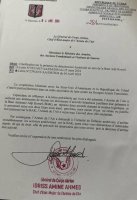LIVINGSTONE, Zambia — Dozens of American military personnel are expected to withdraw from Chad in coming days, three senior U.S. officials said Thursday, amid a broader, involuntary reconfiguration of Washington’s security policy in a volatile part of Africa.
The officials, who spoke on the condition of anonymity to discuss military movements, said the repositioning could be temporary as the United States intends to negotiate with Chad about their security relationship — including potentially returning the troops who departed — following the country’s presidential elections May 6.
It marks the second time in a week the Biden administration has acknowledged it will comply with a host-nation directive to remove deployed forces from an African country deemed integral to U.S. counterterrorism operations in the region. On Friday, officials said the United States
had agreed to pull out more than 1,000 military personnel from neighboring Niger.
The shake-up in Chad affects fewer than 100 Army Special Forces soldiers who are stationed at the French base in N’Djamena, the capital. They had been on a six-month rotation that is ending, according to one of the U.S. officials. A small number of U.S. service personnel working with a regional joint task force
focused on Lake Chad — where the extremist group Boko Haram and its affiliates are active — will remain in the country, this person said.
The official emphasized that unlike in Niger, Chad’s government has not canceled the “status of forces” agreement that governed its military relationship with the United States. Rather, the Special Forces troops’ departure, first reported by the New York Times, follows an apparent disagreement between U.S. officials and a Chadian general, who contended that Washington had failed to produce documents justifying its military presence in N’Djamena and asked the Americans to “immediately stop” their activity at the base.
Those concerns, raised by Idriss Amine Ahmed, a top general in Chad’s air force, were relayed by letter, not through traditional diplomatic channels, according to two U.S. officials. CNN first reported on his letter last week. There was confusion, too, about its intent, with some officials saying the Chadians appeared to want more from the United States in terms of the partnership and others saying Chad’s desires were unclear.
A spokesman for the Chadian government did not respond to requests for comment.
Maj. Gen. Patrick Ryder, the Pentagon press secretary, said Thursday during a news conference that while talks with Chad continue, commanders are “planning to reposition some U.S. military forces.”
He characterized the shift as “a temporary step.”
“They are asking Western partners the question of, ‘What is in it for us?’” one Western official said of the Chadians. “And it’s not such a bad thing for the West to be considering the same thing.”
The discussion around the U.S. military presence in Chad — a vast landlocked nation in Central Africa — is particularly fraught given the rejection of the Western military partnerships in the central Sahelian nations of Mali, Niger and Burkina Faso.
The three former French colonies are facing escalating threats from Islamist extremist organizations, are ruled by military juntas and are
increasingly looking to Russia for military assistance. The respective governments in each have in recent years demanded that French military forces, which historically had been the lead international counterterrorism partner, leave their countries.
The United States, which has not had a security relationship with Mali or Burkina Faso since their coups, had maintained its presence in Niger, which includes a newly constructed drone base that cost $110 million to build.
While U.S. security assistance paused after Niger’s military seized power last summer, negotiations continued, with the United States seeking to compel Niger to agree to a democratic transition. But a tense meeting last month prompted the junta to cancel the status-of-forces agreement and declare the U.S. military presence “illegal.”
The junta’s spokesman said the U.S. delegation had tried to dictate that the West African nation not have relationships with certain other countries, including Iran and Russia.
Unlike in the central Sahel, Chad’s leader, Gen. Mahamat Idriss Déby Itno, who has ruled since 2021, has not called for removal of the French. But he has fostered ties with leaders in the central Sahel and with Russia, and some analysts say a withdrawal by the French is inevitable. Earlier this year,
Déby went to Russia to meet President Vladimir Putin, who said the two countries had “great opportunities to develop our bilateral ties.”
That meeting marked a shift from just last year, when
U.S. intelligence officials warned that Russian mercenaries were working with rebels to overthrow Chad’s government, which then was seen as too pro-Western.
The Western official lauded the multinational task force’s work to counter Boko Haram in the Lake Chad basin, but he said personnel in N’Djamena have seen their mission shrink because the region’s wave of coups have limited the types of military activities that partner forces can do from Chad.
“It’s important to consider our strategic partnerships,” the official said, “to think about what purpose we are serving.”
Maj. Gen. Todd R. Wasmund, who oversees a small number of Army personnel in Chad and Niger, said in an interview that Sahelian countries continue to want to partner with the United States.
“But they also want us to respect them as sovereign nations,” he added. “So we both have to make a choice about how to demonstrate a commitment to shared values and shared objectives.”





